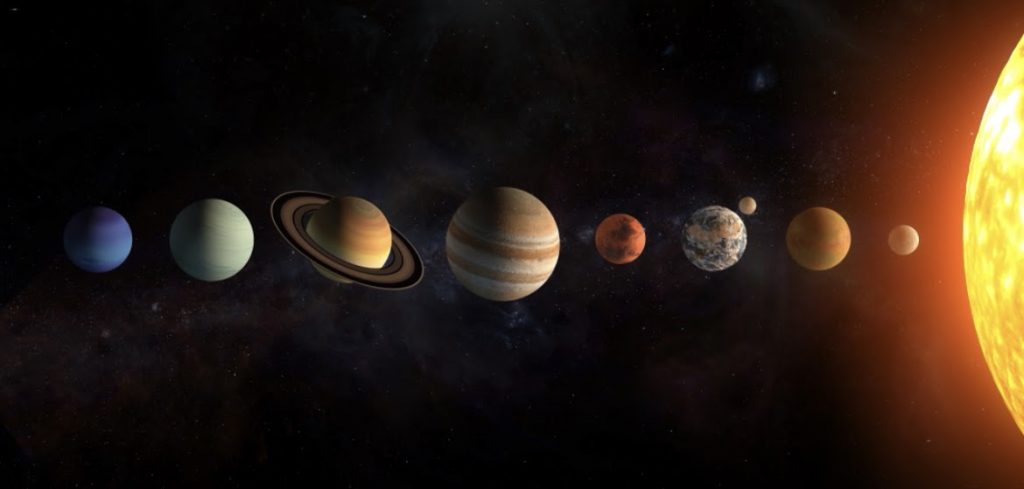
An Astrology Beginner’s Guide to the Planets
Mercury
Mercury is titled after the Roman deity, who worked as a messenger to the gods. It is the innermost and smallest solar system planet. Within astrology, it signifies communication. This planet reflects rationality and logic. Mercury uses its relentless curiosity and clever intellect to analyze, sort, and classify, helping us articulate and synthesize complex ideas. It governs both earth sign Virgo and air sign Gemini, each representing a different side of Mercury’s expression: Analytical Virgo is input, while chatty Gemini is output. Mercury takes 13-14 days to transit a zodiac sign and retrogrades 3-4 times per year. This planet’s notorious retrograde brings about communication catastrophes, travel setbacks, and texts from exes.
Venus
Named for the enchanting Roman goddess, Venus is the energetic planet representing abundance, beauty, and love. Indulgent Venus is most content when luxuriating: Aromatic moisturizers, fine wines, and extended baths align with the Venusian spirit. This planet’s highbrow tendencies reflect our interest in culture and art. Its romantic sensibilities unveil our idealized knowledge of love. Both air sign Libra and earth sign Taurus are ruled by Venus, each depicting a different side of Venus’s expression: flirtatious Libra is cerebral, while sensual Taurus is physical. It takes approximately 4-5 weeks to transit a zodiac sign and goes retrograde every 18 months. During Venus retrograde, try to dodge making major appearance changes, such as plastic surgery or getting a tattoo.
Mars
Named after the god of war, Mars signifies aggression, action, and determination. Its impassioned spirit often displays itself when we’re competing for a selective position, racing to meet a deadline, or running to catch a flight. Mars is the fire beneath us, providing the adrenaline-charged boost of energy that fuels action. It also reflects our physical lust and passion. This planet rules Aries, the impulsive fire sign known for its high-octane enthusiasm. Mars takes around 6-7 weeks to transit a zodiac sign and goes retrograde every 2 years. When it does, we may experience a lack of motivation in the bedroom or have trouble standing up for ourselves.
Jupiter
The solar system/s largest planet, Jupiter — or Zeus, is recognized for its colossal presence in Greek mythology. Lucky planet Jupiter symbolizes spirituality, fortune, philosophy, and abundance. This generous planet rules expansion, encouraging us to broaden our horizons and widen our scope through education, philosophy, and spirituality. It governs Sagittarius, the courageous fire sign known for its thrill-seeking nature. Jupiter takes approximately 12-13 months to transit a zodiac sign and retrogrades each year for about 120 days. Its retrograde is usually a time of philosophical maturity.
Saturn
The ringed gas giant is connected to time, restrictions, and regulations. On a good day, Saturn signifies hard work, steadfast resilience, and professional achievements. However, it can be unemotional and harsh on a bad day, forcing us to learn through difficult challenges and tough love. Though this planet has an unusual way of showing its affection, Saturn actually has our best interest in mind. It just wants us to play by the rules. Saturn rules regimented Capricorn, the ambitious earth sign known for its steadfast ambition. It takes around 2 1/2 years to transit each sign. It goes retrograde every year for about 140 days. During Saturn retrograde, life may feel more limiting, and we must work harder to begin projects.
Uranus
Uranus is strange. It was the first planet detected by a telescope, and the only celestial body named after a Greek deity. It is shifted so far on its axis that it actually orbits the sun on its side. Uranus symbolizes innovation, technology, and rebellion. This revolutionary planet hates commands and is constantly eager to facilitate dynamic, groundbreaking change. Uranus can have unexpected effects (after all, the planet embraces shock value). It rules Aquarius, the free-thinking air sign known for its nonconformity and eccentricity. Uranus takes about 7 years to transit each sign and goes retrograde each year for about 150 days. We are invited to leave the past behind during the planet’s retrograde and continue forward in life.
Neptune
Neptune’s bright azure color flawlessly complements its astrological importance. Neptune, named after the god of the sea, rules the mysterious, magical expanse of the spiritual unknown. When a heavy fog rolls across the ocean, it’s hard to discern the separation between the sky and the water. Neptune’s power exists at the intersection of reality and fantasy. On a good day, Neptunian energy is powerfully psychic and extremely creative. On a bad day, though, it can become escapist and delusional. When Neptune’s influence is perceived, explore your imagination, but remember to toss down an anchor: You never want to become lost at sea. This planet rules Pisces, the intuitive water sign known for its psychic powers and incredible imagination. The planet takes around 14 years to transit each sign and retrograde each year for about 150 days. During Neptune retrograde, secrets are exposed, so don’t try to get away with duplicitous acts.
Pluto
Though this freezing celestial body didn’t hold up to the astronomical definition, Pluto is still a surprisingly big deal by astrological standards. It symbolizes regeneration, power, transformation, and destruction. Named after Hades, the god of the underworld, Pluto’s power is rooted in darkness. This beguiling planet seamlessly slides into complex infrastructures, calmly transforming systems from the center. Pluto reminds us that for us to bring change, we must let go of the past. It is linked with Scorpio, the elusive water sign characterized by its mysterious nature. Pluto takes around 14 -30 years to transit each sign and retrogrades each year for about 185 days. When Pluto goes retrograde, we are invited to let go of what’s no longer serving us so that we can change into a better version of ourselves.